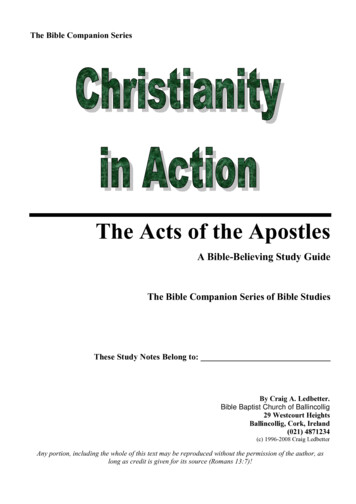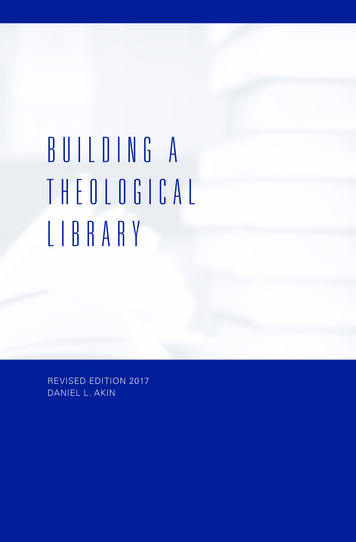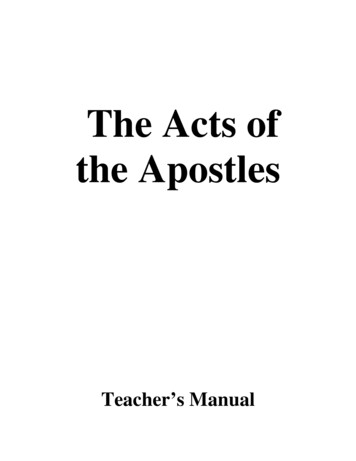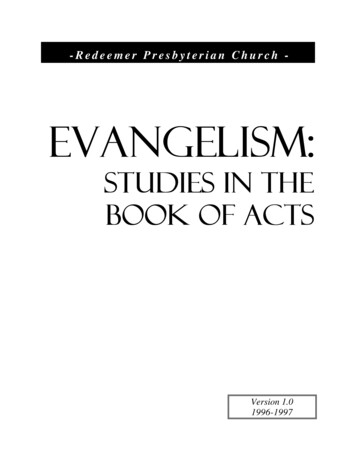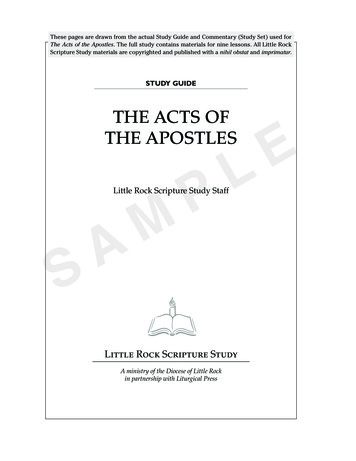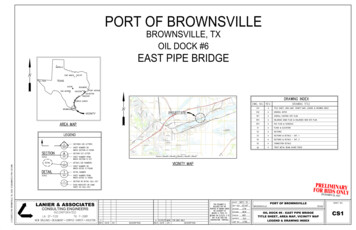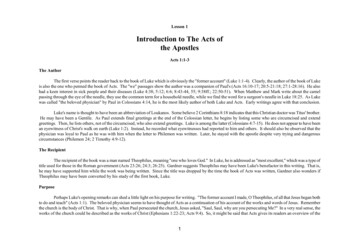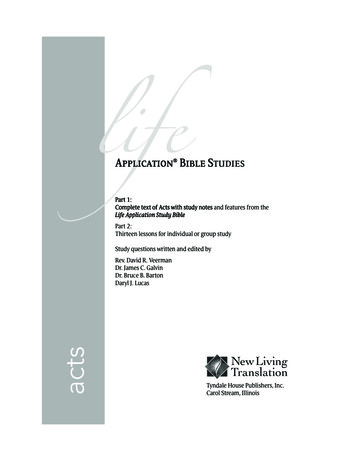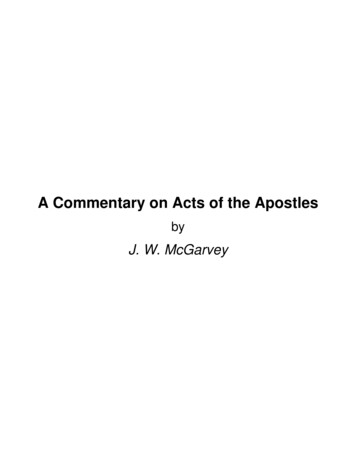
Transcription
A Commentary on Acts of the ApostlesbyJ. W. McGarvey
About A Commentary on Acts of the Apostles by J. W. tor(s):CCEL Subjects:LC Call no:LC Subjects:A Commentary on Acts of the lMcGarvey, J. W.Logos Research Systems, Inc.Public DomainSteve Liguori, stevelig@sprynet.com (Converter)All; BibleBS2625.M3 1872The BibleNew TestamentSpecial parts of the New Testament
A Commentary on Acts of the ApostlesJ. W. McGarveyTable of ContentsAbout This Book. . . . . . . . . . . . . .REVISED VERSION OF THE TEXT.Introduction. . . . . . . . . . . . . . . . .About the Electronic Edition. . . . . . .Acts I. . . . . . . . . . . . . . . . . . . . .Acts II. . . . . . . . . . . . . . . . . . . . .Acts III. . . . . . . . . . . . . . . . . . . .Acts IV. . . . . . . . . . . . . . . . . . . .Acts V. . . . . . . . . . . . . . . . . . . . .Acts VI. . . . . . . . . . . . . . . . . . . .Acts VII. . . . . . . . . . . . . . . . . . . .Acts VIII. . . . . . . . . . . . . . . . . . .Acts IX. . . . . . . . . . . . . . . . . . . .Acts X. . . . . . . . . . . . . . . . . . . . .Acts XI. . . . . . . . . . . . . . . . . . . .Acts XII. . . . . . . . . . . . . . . . . . . .Acts XIII. . . . . . . . . . . . . . . . . . .Acts XIV. . . . . . . . . . . . . . . . . . .Acts XV. . . . . . . . . . . . . . . . . . . .Acts XVI. . . . . . . . . . . . . . . . . . .Acts XVII. . . . . . . . . . . . . . . . . . .Acts XVIII. . . . . . . . . . . . . . . . . .Acts XIX. . . . . . . . . . . . . . . . . . .Acts XX. . . . . . . . . . . . . . . . . . . .Acts XXI. . . . . . . . . . . . . . . . . . .Acts XXII. . . . . . . . . . . . . . . . . . .Acts XXIII. . . . . . . . . . . . . . . . . .Acts XXIV. . . . . . . . . . . . . . . . . .Acts XXV. . . . . . . . . . . . . . . . . . .Acts XXVI. . . . . . . . . . . . . . . . . .Acts XXVII. . . . . . . . . . . . . . . . . .Acts XXVIII. . . . . . . . . . . . . . . . .Indexes. . . . . . . . . . . . . . . . . . . .Index of Scripture References. . . .Index of Scripture Commentary. . .iii.p. iip. 1p. 2p. 7p. 8p. 21p. 45p. 54p. 61p. 67p. 73p. 79p. 101p. 116p. 127p. 136p. 141p. 156p. 164p. 175p. 194p. 204p. 212p. 220p. 233p. 241p. 244p. 249p. 252p. 255p. 259p. 265p. 275p. 275p. 277
A Commentary on Acts of the ApostlesJ. W. McGarveyIndex of Pages of the Print Edition. . . . . . . . . . . . . . . . . . . . . . . . . p. 279iv
Comm on ActsJ. W. McGarveyA COMMENTARYONACTS OF APOSTLES,WITH AREVISED VERSION OF THE TEXT.byJ. W. McGarveySEVENTH EDITIONTRANSYLVANIA PRINTING AND PUBLISHING CO.LEXINGTON, KY.1872.Entered according to Act of Congress, in the year 1863, byJ. W. McGARVEY,In the Clerk's Office of the District Court of the U. S. for the Southern District of Ohio.Transylvania Press
Comm on ActsJ. W. McGarveyIntroduction4It is necessary to the successful study of any literary production, that the exact design of theauthor should be known and kept constantly in view. It would be doing great injustice to the authorof Acts, to suppose that he undertook this work without having before him some one leading object,which should serve as the connecting thread of the narrative, and according to which all the historicdetails should take place and form.The conjecture of commentators as to what this leading object is are various and somewhatconflicting. “The writer's object,” says Dr. Hackett, “if we are to judge of it from what he hasperformed, must have been to furnish a summary of history of the origin, gradual increase, andextension of the Christian Church, through the instrumentality, chiefly of the Apostles Peter andPaul.”1 This is rather a statement of what he has performed than of the object for which he performedit. The same defect attaches to Dr. Alexander's conjecture. He says: “The book before is a specialhistory of the planting and extension of the Church, both among Jews and Gentiles, by the gradualestablishment of radiating centers, as sources of influence, at certain salient points throughout alarge part of the empire, beginning at Jerusalem and ending at Rome.”2 That the history does exhibitthese facts is certainly true, but that there is behind this a design for the accomplishment of whichthese facts are stated, must be equally true.The author's design is equally misunderstood by Bloomfield, and others with him, who say thatit was “to give an authentic account of the communication of the Holy Spirit, and of the miraculouspowers and supernatural gifts bestowed by the Spirit,” and “to establish the full claim of the Gentilesto be admitted into the Church of Christ.”3 It is true that the history establishes the claim of theGentiles to admission into the Church, and also contains an account of the descent and work of theHoly Spirit, yet neither of these can be regarded as the leading thought around which the contentsof the volume adjust themselves.Mr. Barnes, in the midst of some detached statements upon this subject, has approached thetrue idea in the following characteristic remark: “This book is an inspired account of the characterof true revivals of religion.”4 But the true idea is still more nearly approached by a writer in Kitto'sEncyclopedia who says: “Perhaps we should come still closer to the truth if we were to say that thedesign of Luke, in writing Acts, was to supply, by select and suitable instances, an illustration ofthe power and working of that religion which Jesus had died to establish.”5It is correctly assumed by Dr. Hackett, in the words above quoted, that we are to judge of awriter's design by what he has performed. Bearing in mind the distinction between the work doneand the design for which it is done, a slight glance at the contents of this book will reveal to us adesign which has escaped the notice of all the above-named writers.Much the greater part of Acts may be resolved into a detailed history of cases of conversion,and of unsuccessful attempts at the conversion of sinners. If we extract from it all cases of this kind,12345Com. on Acts, Int., p. 19.Com. on Acts, Int., p. 13.Greek Testament, with English notes, Int. to Acts.Notes on Acts, Int.Article, Acts.2
Comm on Acts5J. W. McGarveywith the facts and incidents preparatory to each and immediately consequent upon it, we will haveexhausted almost the entire contents of the narrative. All other matters are merely incidental. Theevents of the first chapter were designed to prepare the apostles for the work of converting men;the gift of the Holy Spirit to them and to others was to qualify them for it; the admission of theGentiles was an incident connected with the conversion of Cornelius, and others after him; theconference, in the fifteenth chapter, grew out of these conversions; and the long account of Paul'simprisonment in Jerusalem, Caesarea, and Rome, with his sea-voyage and shipwreck, constitutebut the connected history of his preaching to the mob in Jerusalem, to the Sanhedrim, to Felix, toFestus, to Agrippa, and to the Jews and Gentiles in Rome. The episode in the twelfth chapter,concerning the persecutions by Herod, and his death, is designed to show that, even under suchcircumstances, “the word of God grew and multiplied.” All the remainder of the history consists,unmistakably, in detailed accounts of conversions.Such being the work performed by the author, we may readily determine his design by inquiring,Why should any cases of conversion be put upon the record? Evidently, it was that men might knowhow conversions were effected, and in what they consisted. The cases which are recorded representall the different grades of human society; all the different degrees of intellectual and religiousculture; all the common occupations in life, and all the different countries and languages of thethen known world. The design of this variety is to show the adaptation of the one gospel schemeto the conversion of all classes of men.The history of a case of conversion, necessarily embraces two distinct classes of facts: First,the agencies and instrumentalities employed in effecting it; second, the changes effected in theindividual who is the subject of it. In the pursuit of his main design, therefore, the author was ledto designate specifically all these agencies, instrumentalities, and changes. He does so in order thathis readers may know what agents are employed, and how they work; what instrumentalities mustbe used, and how they are applied; and what changes must take place, in order to the Scripturalconversions of a sinner.The chief agent employed in the conversion of men is the Holy Spirit. It is this fact which ledthe author to detail so minutely the descent of the Holy Spirit, and the various gifts and influencesby which his work was accomplished. He thus teaches the reader what part this divine agentperformed in the conversion of sinners, and how he performed it.Another important agency employed was the personal labor of the apostles and inspiredevangelists. The manner in which their part of the work was performed is carefully described, inorder that men of every age and country, whose business it is to perform the part corresponding totheirs, may learn, from their example, how to perform it Scripturally. But Peter and Paul were thechief laborers of that generation, and for this reason their names occupy the prominent positionassigned them.It is well known that the recital by men of the process of their conversion is well calculatedboth to teach sinners the process through which they must struggle in order to conversion, and tostimulate them to undertake it. Men are taught more successfully and influenced more powerfullyby example than by precept. Many religious teachers of the present day, having discovered thepractical workings of this principle in human nature, depend much more, in their efforts to convertsinners, upon well-told experiences than upon the direct preaching of the Word. The success whichhas attended this policy should admonish us that these experiences of conversion recorded in Actsare by no means to be lightly esteemed as instrumentalities for the conversion of the world. They3
Comm on Acts6J. W. McGarveypossess, indeed, this advantage: that, in contrast with all the conversions of the present day, theywere guided by infallible teaching, and were selected by infallible wisdom from among thousandsof others which had occurred, because of their peculiar fitness for a place in the inspired record.They have, we may say, twice passed the scrutiny of infinite wisdom; for, first all the conversionswhich occurred under the preaching of inspired men were directed by the Holy Spirit; and, second,if any difference existed between those put on record and the others, the Holy Spirit, by selectingthese few, decided in their favor as the best models for subsequent generations. If a sinner seeksalvation according to the model of modern conversions, he may be misled; for his model is fallibleat best, and may be erroneous; but if he imitate these inspired models, it is impossible for him tobe misled, unless the Holy Spirit itself can mislead him. Moreover, in so far as any man's supposedconversion does not accord with these, it must be wrong; in so far as it does accord with them, itmust be right.If it be asked why we may not as well take for our model the cases of conversion which occurredunder the former dispensation, or during the life of Jesus, the answer is obvious. We do not liveunder the law of Moses, or the personal ministry of Jesus, but under the ministry of the Holy Spirit.Jesus, just previous to his ascension, committed the affairs of his kingdom on earth into the handsof twelve men, to be guided by the Holy Spirit, who descended shortly after he ascended; and nowall that we can know of present terms of pardon must be learned through the teaching and exampleof these men. If, then, the conditions of pardon under any preceding dispensation be found to differfrom those propounded in Acts, in all the points of difference the latter, and not the former, mustbe our guide. These are the last, and certainly the most elaborately detailed communications of theDivine will upon the subject, and belong peculiarly to the new covenant under which we live. IfGod has made them to differ, in any respect, from those under the old covenant, he teaches us, bythis very difference, that he has thus far set aside the old through preference for the new. In thefollowing pages it is made a leading object to ascertain the exact terms of pardon as taught by theapostles, and the precise elements which constitute real conversion to Christ.The present is pre-eminently a missionary period of the Church. None has been more so, exceptthe age of the apostles. Especially is it distinguished by success in the conversion of sinners inprofessedly Christian lands. Hence, it is a demand of the age that the true method of evangelizingthe world should be known and read of all men. But the true method can be found only in the laborsof inspired apostles and evangelists, and the record of these labors is found only in the book ofActs. A failure to understand and to appreciate this book has been, and still is, a most prolific sourceof confusion and error in the popular presentation of the gospel. But failing to discover its chiefdesign, sinners are far more frequently directed to the Psalms of David for instruction upon thesubject of conversion than to this book, which was written for this express purpose. There is,therefore, no one book in all the Bible to which the present generation of Bible readers so muchneed to have their attention specially directed. We have endeavored, in this volume, to set forth thelabors of these inspired preachers as the true and infallible guide of the modern evangelist.Another peculiarity of the present age is, the unlimited range given to speculations concerningthe agency of the Holy Spirit in human redemption. A subject into which investigation should neverhave been pushed beyond the simple facts and statements of revelation, has thus become a mostfruitful source of philosophical vagaries and of unbridled fanaticism. Whatever differences mayappear among the many erroneous theories upon the subject, they all agree in the conception of adirect impact of the Spirit of God upon the spirit of man, by which the latter is enlightened and4
Comm on Acts7J. W. McGarveysanctified. This conception is not only common to them all, but it is the fundamental conceptionin each one of them. Under the influence of it, the more contemplative theorist receives newrevelations, or “speaks as he is moved by the Holy Ghost;” the more enthusiastic calls for outpouringsof the “Holy Spirit and of fire,” dances, shouts, and falls in spasms; while the transcendentalist,receiving still further measures of the Spirit, points out mistakes made by the inspired apostles, andexposes defects in the character of Jesus.Among the prevailing Protestant sects, a common theory of spiritual influence serves almostas a bond of union. It sometimes makes them almost forget the conflicts of past ages, melts downthe cold barrier of separating creeds, and brings hereditary enemies together, to worship, for a time,at a common shrine. It is made the standard of orthodoxy; and to him who devoutly swears by it,it serves, like charity, to cover a multitude of sins, while to him who calls it in question, and contentshimself with the very words of Scripture, it is a ban of excommunication. A difference on all othersubjects is tolerated, if there is agreement on this; an agreement on all other subjects can be nobond of union, if there is a difference on this. In public discourse all other topics are madesubordinate, and even the preaching of Christ, which was the work of the apostles, has beensupplanted by preaching the Holy Spirit.Various as are the conclusions of these theorists, they all have a common tendency to disparagethe Word of God. Precisely as a man learns to depend upon internal admonitions for his religiousguidance will he feel less dependence upon the written Word. Hence it is that the masses of thepeople, who are under the influence of these teachings, are so deplorably ignorant of the Bible. Tocall back the mind of the reader from all such vagaries to the revealed facts and simple apostolicstatements upon this important subject, is another leading object of the following work. We willfind that the book of Acts presents, in living form and unmistakable simplicity, the work of theHoly Spirit.Some sixteen of the twenty-eight chapters of Acts are devoted almost exclusively to the laborsof the Apostle Paul. Whatever can be known of this most heroic and successful of all the apostlesmust not only be interesting to every reader, but also highly instructive, as an example of faith inChrist in its higher development. Some of the most interesting facts in his history, and those whichthrow the greatest light upon his inner life, are not recorded by Luke, but may be gathered fromincidental remarks in his own epistles. In this obscure position, they must ever escape the noticeof ordinary readers. It is proposed, in this volume, to give them their chronological place in thenarrative, thus filling up the blanks which Luke's design caused him to leave, and rounding out tosome fullness and symmetry the portraiture of this noblest of all human subjects of Scripturebiography.We have already assumed, in accordance with the universal judgment of competent critics, thatLuke is the author of Acts. For the evidences on which this judgment is based, I refer the reader toworks devoted to this department of Scripture study. It appears, from his being distinguished byPaul, in Gal. iv. 11–14, from those “of the circumcision,” that he was a Gentile, but of what countryis not certainly known. He was a physician by profession, and is styled by Paul “the belovedphysician.”6 This encomium, together with the fact that he shared with Paul many of the labors ofhis life, was his ever-present companion in his imprisonment, even his only companion in the6Col iv. 14.5
Comm on Acts8J. W. McGarveyclosing scenes of his life;7 and that we detect his presence or absence in the scenes of the narrativeonly as he used the pronoun we or they to describe the party, are circumstances which indicate acharacter marked by great courage and endurance, yet softened by extreme modesty and warmaffections. That he was a most enthusiastic admirer of Paul is evident both from the devotion withwhich he clung to his side, and from the vividness with which every peculiar expression ofcountenance and gesture of the apostle impressed his memory. He frequently records the sweepingmotion of the hand with which Paul arrested the attention of an audience, and the glance with whichhe fixed his eyes upon the enemies of the truth. Yet, notwithstanding this personal admiration, sojust is his sense of propriety that he never pauses for a moment to express his admiration for thewonderful developments of character which he portrays. In this, however, he but imitates adistinguishing peculiarity of all the inspired writers.The book of Acts embraces a period of about thirty years—from the ascension of Christ, a.d.33, to the end of the second year of Paul's imprisonment at Rome, a.d. 63. In the latter part of theyear 63, or the beginning of 64, while Luke was still with Paul in Rome, it is most likely that thework was published. For the historical connection and chronology of particular events describedin the work, the reader is referred to the body of the Commentary.It was no part of my original design to undertake a revision of the English text of Acts, but Ihoped that, ere this time, an improved version of the whole New Testament would be put into thehands of the public by the American Bible Union. No final revision of Acts, however, havingappeared from that Society, or from any other source, up to this writing, I am constrained to contentmyself with such a revision of the text as I have been able to prepare during the progress of thework. I have aimed to preserve, in general, the language of the common version. Where the proprietyof a change would be obvious to the reader of the Greek, or depends merely upon taste, no notesare given to justify it. In cases where a defense seemed to be needed, the reader will find it, eitherin the body of the work or in foot-notes. I beg the critical reader, however, to remember that therevision is designed not for general adoption, but simply for the purpose to which it is applied inthis Commentary, and that, even here, it is a secondary part of the undertaking.In the execution of the work, I have aimed to make not merely a book of reference, but a volumeto be read consecutively through, with the interest which belongs to the narrative. In order to thisend, I have aimed to make a prominent the author's connection of thought throughout; and, in orderto render it the more instructive, wherever the text presents important issues connected with thegreat religious questions of the day, I have taken time to elaborate the argument as freely as thespace which I had allotted myself would admit. [8]72 Tim. iv. 11.6
Comm on ActsJ. W. McGarveyABOUT THE ELECTRONIC EDITION.This electronic edition of J. W. McGarvey's A Commentary on Acts of Apostles has beentranscribed from the text of the seventh edition (Lexington, KY: Transylvania Printing and PublishingCo., 1872). The commentary, without external links to Scripture references, was first publishedonline with Dr. Hans Rollmann's Restoration Movement Texts at Memorial University ofNewfoundland.This electronic edition is in the public domain and may be freely distributed and used forpersonal, non-commerical, or commerical purposes. Although no permission is required for use ofthis work, the editor does appreciate hearing about how it is being used to promote Bible study andto honor our Soon-Coming King.Addenda and corrigenda are earnestly solicited.Ernie Stefanik373 Wilson StreetDerry, PA 15627-9770412.694.8602stefanik@westol.comCreated 7 June 1997.Updated 16 October 1998[The original edition by Ernie Stefanik was converted for use by Logos, Inc, and from thereconverted to ThML for use at the Christian Classics Ethereal Library, http://www.ccel.org, 2003-06.]7
Comm on ActsJ. W. McGarveyActs I910I: 1, 2. A NARRATIVE of Jesus of Nazareth, designed to convince men that he is the Christ, wouldmost naturally begin with his birth and terminate with his ascension to heaven. Such was the “formernarrative” which Luke had addressed to Theophilus, and he alludes to it as such in introducing hispresent work: (1) “The former treatise I composed, O Theophilus, concerning all that Jesus beganboth to do and to teach, (2) until the day in which, having given commandment through the HolySpirit to the apostles whom he had chosen, he was taken up.”This reference to his former narrative is most appropriate in its place, inasmuch as the one nowundertaken is based entirely upon it. The specific reference to “the day in which, having givencommandment through the Holy Spirit to the apostles whom he had chosen, he was taken up” isstill more in point, from the fact that all the authority which the apostles had for the labors Luke isabout to narrate was derived from the commandment given on that day. The history of that dayfurnishes but one commandment then given, which was the apostolic commission. In thiscommission, then, Luke locates the starting point of his present narrative.If we would appreciate the narrative thus briefly introduced to us, we must begin with the author,by a proper understanding of this commission.During the personal ministry of Jesus, he authorized no human being to announce hisMessiahship. On the contrary, whenever he discovered a disposition to do so, he uniformly forbadeit, and this not only to various recipients of his healing power, but to the apostles themselves. WhenPeter made the memorable confession, “Thou art the Christ, the Son of the living God,” we are toldthat, at the close of the conversation, “he charged his disciples that they should tell no man that hewas Jesus the Christ.”8 Such was his uniform injunction on similar occasions. Even when Peter,James, and John had witnessed his transfiguration, and heard God himself proclaim him his Son,as they came down from the mount, “Jesus charged them, saying, Tell the vision to no man, untilthe Son of man is risen from the dead.”9This stern prohibition, quite surprising to most readers of the New Testament, may be accountedfor, in part, by a desire to avoid that political ferment, which, in the existing state of the publicmind, might have resulted from a general belief among the Jews that he was their Messiah. Butthere is a much more imperative reason for it, found in the mental and moral condition of thedisciples themselves. Their crude conceptions of the Messiahship, their gross misconception of thenature of the expected Kingdom, their misunderstanding of much that he had taught them, and theirimperfect remembrance of that which they had understood, rendered them incapable of presentinghis claims truthfully, not to say infallibly, to the world. Moreover, their faith had not, as yet, acquiredthe strength necessary to the endurance of privations and persecutions. While laboring under thesedefects, they were most wisely prohibited from preaching that he was the Christ.During the last night he spent on earth, Jesus at length informed them that this restriction wouldsoon be removed, and they should receive the qualifications necessary to be his witnesses. He says,“The Advocate, the Holy Spirit, whom the Father will send in my name, he shall teach you all89Matt. xvi. 20.Matt. xvii. 9.8
Comm on Acts11J. W. McGarveythings, and bring all things to your remembrance, whatsoever I have said to you.”10 “I have manythings to say to you, but you can not bear them now; howbeit when he, the Spirit of truth, is come,he will guide you into all the truth.“11 “He shall testify of me: and you also shall testify, becauseyou have been with me from the beginning.”12 In these words they have a promise that they shalltestify of Jesus, with the Holy Spirit for their guide; but the promise looks to the future for itsfulfillment.Finally, “in the day in which he was taken up,” he gives them the commandment which is tounseal their lips, and authorizes them to preach the glad tidings to every creature. Without thiscommandment, they could not have dared to tell any many that he was the Christ; with it, they areauthorized to begin the labors which our historian is about to narrate. But even yet there is onerestriction laid upon them; for they have not yet received the promised qualifications. “Hecommanded them that they should not depart from Jerusalem; but await the promise of the Father,which you have heard from me.”13Such was the necessity for the commandment in question, and for the limitation which attendedit when given. The items of which it is composed are not fully stated by either one of the historians,but must be collected from the partial statements of Matthew, Mark, and Luke. Matthew presentsthree of them, as follows: “Go, disciple all nations, immersing them into the name of the Father,and of the Son, and of the Holy Spirit, teaching them to observe and do all whatsoever I havecommanded you.”14 Mark presents five items in these words: “Go preach the gospel to everycreature; he who believes and is immersed shall be saved; he who believes not shall be condemned.“15Luke simply states that Jesus said, “Thus it behoved the Christ to suffer, and to rise from the deadthe third day, and that repentance and remission of sins should be preached in his name among allnations, beginning at Jerusalem.”16 If we combine these items, by arranging them in their naturalorder of succession, we will have the commission fully stated.The command quoted by Mark, “Preach the gospel to every creature,” necessarily comes first.The command, “Disciple all nations,” is next in order; for it is by means of preaching that theywere to make disciples. But when a man is made a disciple he becomes a believer; and Matthewand Mark agree in the statement that he who believes, or in Matthew's style, he who is discipled,is then to be immersed. Luke, however, says that repentance must be preached, and as repentanceprecedes obedience, we are compelled to unite it with faith, as antecedent to immersion. Next afterimmersion comes Mark's statement, “he shall be saved.” But salvation may be either that whichthe pardoned sinner now enjoys, or that to be enjoyed after the resurrection from the dead: hencethis term would be ambiguous but for Luke's version of it, who quotes that “remission of sins” isto be preached. This limits the meaning of the promise to that salvation which consists in remissionof sins. Next after this comes the command, “teaching them to observe and do” what I havecommanded you. Finally, they were to proclaim that they who believed not, and, consequently,complied not with the terms of the commission, should be condemned. In brief, they were1011121
A Commentary on Acts of the Apostles by J. W. McGarvey. This document has been generated from XSL (Extensible Stylesheet Language) source with RenderX XEP Formatter, version 3.7.3 Client Academic. . It is necessary to the successful study of any literary production, that the exact design
